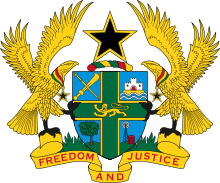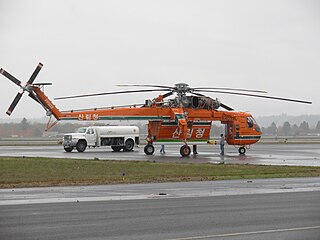 | |
| Agency overview | |
|---|---|
| Jurisdiction | Government of Ghana |
| Headquarters | P.O Box M42, Accra |
| Minister responsible | |
| Website | mint.gov.gh |
The Ministry of the Interior is a ministry of the government of Ghana. [1]
 | |
| Agency overview | |
|---|---|
| Jurisdiction | Government of Ghana |
| Headquarters | P.O Box M42, Accra |
| Minister responsible | |
| Website | mint.gov.gh |
The Ministry of the Interior is a ministry of the government of Ghana. [1]
The Ministry is headed by the Minister of Interior, who is appointed by the President of Ghana and is approved by the Ghana Parliament after a vetting process. The current Minister of Interior is Henry Quartey since 14 February 2024.
In order to ensure the proper functioning of the Ministry, it has it functions being divided into seven major objectives. These are aimed at achieving the wholist purpose of the Ministries aim of maintaining internal peace: [1]
 |
|---|
| Constitution |
The Ministry of Interior being the government's chief agency in charge of maintenance and enforcement of Internal Law and Order has agencies under it that have specific functions aimed at achieving the overall purpose of the Ministry and the country as a whole. The Institutions through which the Ministry performs its functions are: [2] To achieve its mandate and objectives, the Ministry operates through ten (10) Agencies:

The Cabinet Office (CAO) is an agency of the Cabinet of Japan. It is responsible for handling the day-to-day affairs of the Cabinet. The Cabinet Office is formally headed by the Prime Minister.

Emergency management or disaster management is a science and a system charged with creating the framework within which communities reduce vulnerability to hazards and cope with disasters. Emergency management, despite its name, does not actually focus on the management of emergencies, which can be understood as minor events with limited impacts and are managed through the day-to-day functions of a community. Instead, emergency management focuses on the management of disasters, which are events that produce more impacts than a community can handle on its own. The management of disasters tends to require some combination of activity from individuals and households, organizations, local, and/or higher levels of government. Although many different terminologies exist globally, the activities of emergency management can be generally categorized into preparedness, response, mitigation, and recovery, although other terms such as disaster risk reduction and prevention are also common. The outcome of emergency management is to prevent disasters and where this is not possible, to reduce their harmful impacts.
Law enforcement in Malaysia is performed by numerous law enforcement agencies and primarily the responsibility of the Royal Malaysia Police. Like many federal nations, the nature of the Constitution of Malaysia mandates law and order as a subject of a state, which means that local government bodies also have a role to play in law enforcement, therefore the bulk of the policing lies with the respective states and territories of Malaysia. Below are some of the law enforcement bodies and agencies of Malaysia.

The Mexican Secretariat for Home Affairs is the public department concerned with the country's domestic affairs, the presenting of the president's bills to Congress, their publication on the Official Journal of the Federation, and certain issues of national security. The country's principal intelligence agency, CISEN, is directly answerable to the Secretary of the Interior. The Secretary is a member of the President's Cabinet and is, given the constitutional implications of the post, the most important Cabinet Member. Additionally, in case of absolute absence of the President, the Secretary of Interior assumes the executive powers of the President provisionally. The Office is practically equivalent to Ministries of the Interior in most other countries and is occasionally translated to English as Ministry, Secretariat or Department of the Interior.

The Korea Forest Service is a central administrative agency under the Ministry of Agriculture, Food and Rural Affairs (MAFR), responsible for protecting and nurturing forests, increasing forest resources, developing forest products, conducting research on forest management and improvement, and is located in Daejeon Government Complex. In the past, during the national forestation campaign from 1973 to 1986, it was temporarily under the Ministry of Home Affairs, but returned to the Ministry of Agriculture, Forestry and Fisheries in 1987. However, as the agency's work was focused solely on maintaining and managing successful national forestation policies, questions were raised about its necessity for a period of time. Currently, the agency has transformed its identity into one that strives to generate continuous income through forest resources.
The counter-terrorism page primarily deals with special police or military organizations that carry out arrest or direct combat with terrorists. This page deals with the other aspects of counter-terrorism:

The Ministry of Women, Family and Community Development, abbreviated KPWKM, is a ministry of the Government of Malaysia responsible for social welfare: children, women, family, community, older people, destitute, homeless, disaster victim, disabled. The ministry determines the policies and direction to achieve the goals of gender equality, family development and a caring society in line with Malaysia's commitment towards the United Nations' Convention on the Elimination of All Forms of Discrimination Against Women and the Beijing Declaration.

The Ministry of the Interior is a cabinet level ministry under the Executive Yuan of the Republic of China (Taiwan). It is the ministry responsible for home affairs and security throughout Taiwan, including population, land, construction, military service administration, national emergency services, local administration systems, law enforcement.
The Ministry of National Security (MNS) is a statutory under the government of Jamaica responsible for maintaining national safety through the enforcement of law and order. It has its headquarters in the North Tower of the NCB Towers in Kingston. It is also charged with preserving the security of Jamaica’s borders. Previously known as the Ministry of National Security and Justice it was then separated in 2001 to ensure that both ministries ran efficiently within their respective purviews. To accomplish its roles and responsibilities the ministry has multitude of divisions within its organization ranging from the Jamaican Constabulary Force (JCF) the official policing force of Jamaica to the Passport, Immigration and Citizenship Agency (PICA) which safeguards its borders..The salary of this cabinet position is JMD $8,031,788 annually.

The Ghana Health Service (GHS) is a Ghanaian government body established in 1996 as part of the Health Sector Reform of Ghana. The Health Service is under the Ministry of Health. The health service primarily administers the health services in Ghana provided by the government and implements government policies on healthcare. The current Director-General of the Health service is Dr. Patrick Kuma-Aboagye who was appointed by President Nana Akufo-Addo on November 25th 2019 to replace Dr. Anthony Nsiah-Asare

The National Disaster Management Organisation (NADMO) is the government agency that is responsible for the management of disasters as well as other emergencies in Ghana. The board operates under Ghana's Ministry of Interior.
Ghana'sMinistry of Food and Agriculture (MOFA) is the government agency responsible for the development and growth of agriculture in the country. The jurisdiction does not cover the cocoa, coffee, or forestry sectors. The primary organisation and main area of the presidential administration of Ghana is the nation's Ministry of Food and Agriculture (MOFA), which is in charge of creating and carrying out policies and plans for the agricultural sector within the framework of an efficient national socio-economic development and prosperity agenda. The Ministry's plans and programmes are created, coordinated, and put into effect using frameworks for policy and strategy using a sector-wide approach. The Food and Agriculture Sector Development Policy II and the Medium Term Agriculture Sector Investment Plan were both developed with the aid of MOFA in relation to this.

The Ministry of Youth and Sports of Ghana is the government agency responsible for youth empowerment and sports development.

The Latvian Environment, Geology and Meteorology Centre is a governmental service under the Ministry of Environmental Protection and Regional Development of Latvia.
Many countries around the world have civil defense organizations dedicated to protecting civilians from military attacks and providing rescue services after widespread disasters. In most countries, civil defense is a government-managed and often volunteer-staffed organization.

The Ministry for Chieftaincy and Traditional Affairs is the official Ghanaian agency responsible the creation of linkages between the Government of Ghana and the traditional authorities in the country. Based on recommendations by the African Peer Review Mechanism and the citizenry the Jerry John Rawlings administration established the ministry to address the recommendations. The Ministry was set up in 1993 and is backed by the Civil Service Law, 1993. Prior to its establishment, its functions were performed by two agencies namely the Chieftaincy Division Secretariat under the Office of the President and the Culture Division under the National Commission on Culture.
The Ministry of Environment, Science, Technology and Innovation is the ministry of Ghana responsible for the development of environment and science in the country.

The State Research Agency (AEI) is a Spanish state agency responsible for the promotion of scientific and technical research in all areas of knowledge through the competitive and efficient allocation of public resources, the monitoring of actions financed and their impact, and advice on action planning or initiatives through which the R&D policies of the General State Administration are implemented.
The State Agency for the Evaluation of Public Policies and Quality of Services (AEVAL), commonly known as The Evaluation and Quality Agency, was a Spanish public agency responsible for the promotion, performance evaluation, and impact analysis of public policies and programs. The agency handled service quality management, promoted the rational use of resources, and ensured accountability to the public.

The Ministry of Fisheries and Aquaculture Development is a ministry in the Ghanaian government that concentrates on carrying out development interventions to move the fisheries sector and the industry to contribute efficiently to the overall development of the Ghanaian economy. This forms part of the 2014-2017 Sector Medium Term Development Plan.